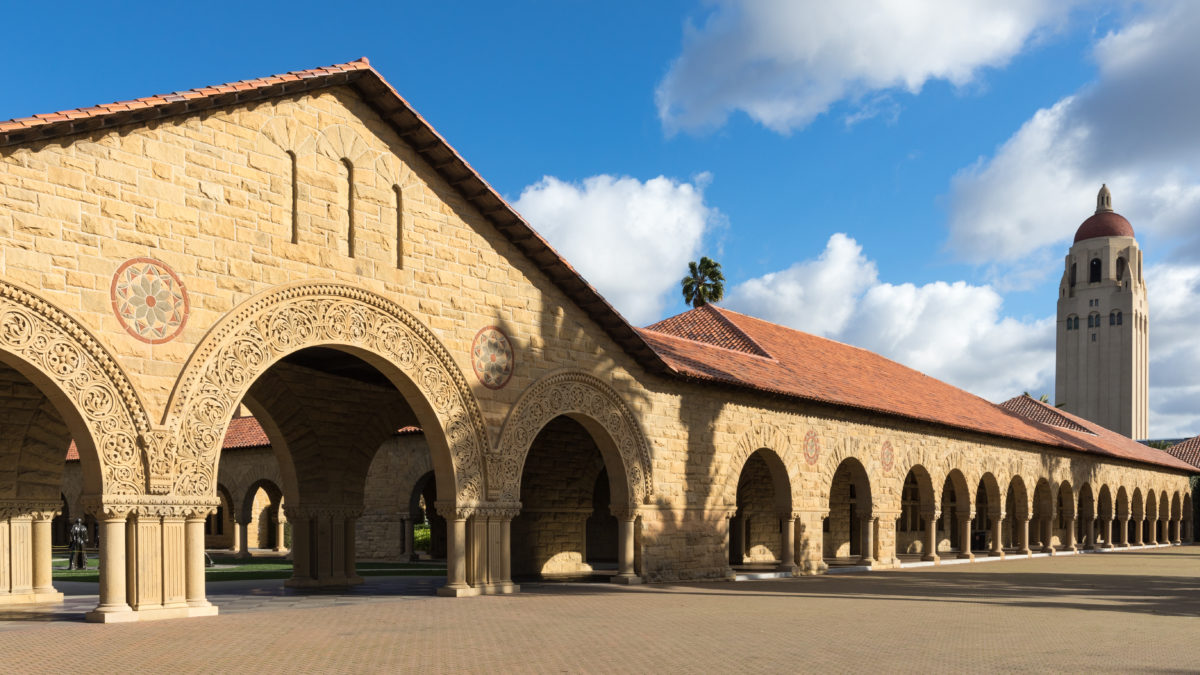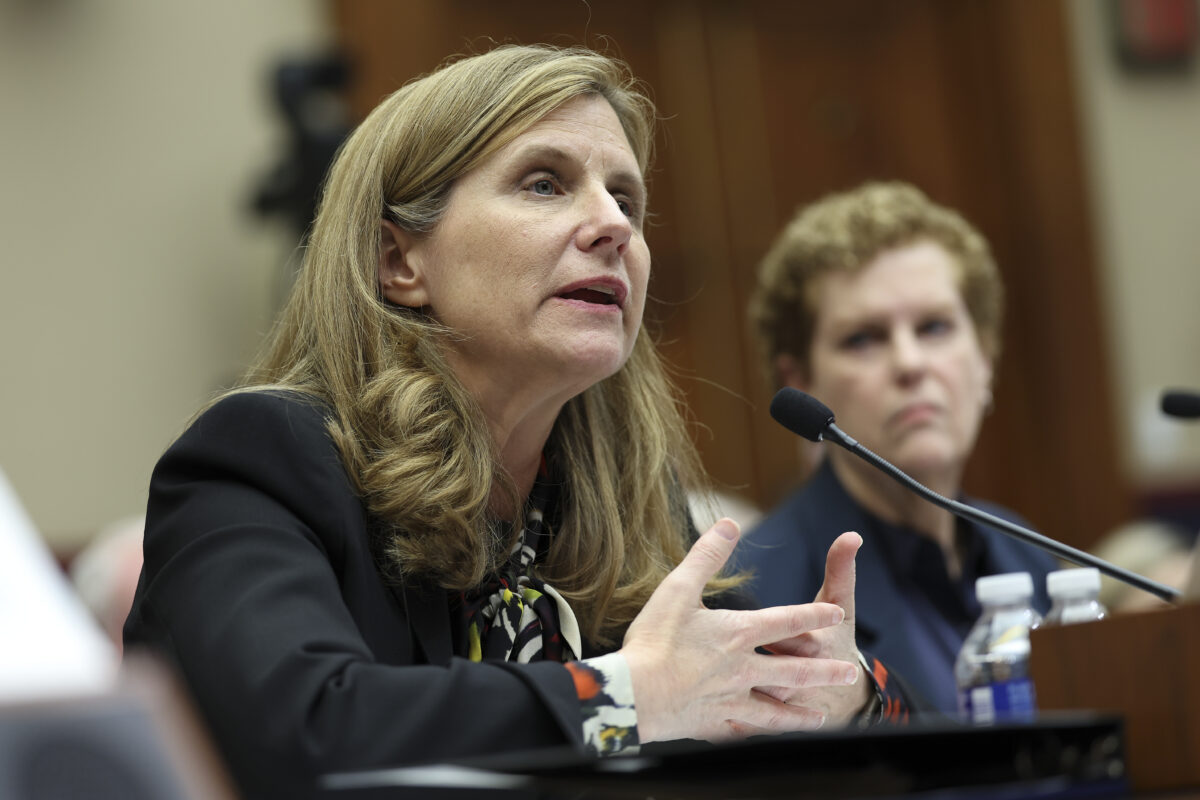Daily Kickoff
Good Monday morning.
In today’s Daily Kickoff, we cover the continued fallout from last week’s Capitol Hill hearing on antisemitism on college campuses, and report on comments from Sen. Lindsey Graham at the Doha Forum on Sunday. Also in today’s Daily Kickoff: Vice President Kamala Harris, Julie Platt and Alexis Grenell.
In Washington tonight, President Joe Biden and First Lady Jill Biden are hosting their annual Hanukkah reception. Central Synagogue Rabbi Angela Buchdahl will lead the candlelighting, which will be done by Second Gentleman Doug Emhoff and descendants of Holocaust survivors.
One of the unanticipated takeaways from last week’s closely watched congressional hearing on antisemitism is that leading Democrats have, belatedly, joined the furor over the indulgence of anti-Israel and antisemitic radicalism on the nation’s elite campuses, Jewish Insider Editor-in-Chief Josh Kraushaar writes.
Rep. Elise Stefanik (R-NY), the star questioner of the hapless university presidents at the hearing, received some begrudging respect from her critics on the left. Emhoff, at the annual national Menorah Lighting last Thursday, denounced the university presidents’ lack of moral clarity as “unacceptable.”
About a dozen House Democrats wrote a letter on Friday to the boards of Harvard, MIT and the University of Pennsylvania demanding answers on how they’re dealing with ascendant antisemitism on their campuses after the disastrous hearing.
Even Sen. Elizabeth Warren (D-MA), whose political base is the academic left,told CNBC last week: “If you can’t lead, if you can’t stand up and say what’s right and wrong — very much in the extreme cases, and these are the extreme cases, then you’ve got a problem.”
As The New York Times put it in a headline Sunday, “Republicans have been attacking elite universities for years. After a tense congressional hearing last week, many on the left are joining them.”
It’s now evident that these university presidents, cosseted in an ideological bubble on campuses, were totally unprepared when their traditional allies didn’t come to defend them. Instead, in a rare example in today’s polarized Washington, they invited a bipartisan uproar over their lack of moral leadership.
Elizabeth Magill, the president of the University of Pennsylvania, is now out, her fate sealed not just by her tone-deaf answers but the dismissive smirk she displayed in addressing Stefanik’s questions about whether calling for the genocide of Jews constituted bullying or harassment on her campus. Harvard President Claudine Gay is also facing the heat at Harvard, and later apologized for her answers at the hearing. (MIT President Sally Kornbluth, by contrast, issued no follow-up statement and her board has announced support for her to remain.)
The looming question is whether this moment of clarity will lead to a deeper examination of why there’s been so much antisemitism on these elite campuses in the first place.
Rabbi David Wolpe, who resigned last week from Harvard’s antisemitism advisory committee,wrote: “The system at Harvard along with the ideology that grips far too many of the students and faculty, the ideology that works only along axes of oppression and places Jews as oppressors and therefore intrinsically evil, is itself evil.”
This worldview is pervasive at most universities, and is backed by a layer of administrative bureaucracy that makes it a more systemic problem than any one individual. Now that more Americans are paying attention to where these ideas lead, will this bipartisan moment lead to more politicians waking up to the problem?
As Fareed Zakaria said on his CNN show Sunday: “To understand [the university presidents’] performance, we have to understand the broad shift that has taken place at elite universities, which have gone from being centers of excellence to institutions pursuing political agendas. People sense the transformation.”
campus beat
Stanford’s antisemitism committee co-chair aligned with anti-Israel groups, concluded antisemitism wasn’t a problem on campuses in 2017 paper

Amid rising tensions on college campuses since the onset of the Israel-Hamas war, it may come as no surprise that Stanford University’s newly formed Antisemitism Committee is already touching off a debate — before it has even held its first meeting. The controversy centers on the faculty co-chair of the committee, Ari Kelman, an associate professor in Stanford’s Graduate School of Education and Religious Studies, and his record of downplaying the threat of campus antisemitism along with his recent alliances with anti-Israel groups, eJewishPhilanthropy’s Haley Cohen reports for Jewish Insider.
Kelman’s conclusion: Kelman authored a 2017 paper on antisemitism he co-wrote with several other Stanford faculty members. The 36-page report, called “Safe on the Sidelines,” concluded that antisemitism isn’t a problem on college campuses because “different representations of campus culture come from the difficulties in defining what counts as political speech and what counts as antisemitism.”
Student concerns: That conclusion, along with Kelman’s appointment and whether the committee will consider anti-Zionism as a form of antisemitism, “concerns a number of us,” a Jewish MBA student at Stanford who requested anonymity to discuss a sensitive matter told JI.
Problematic partnerships: Kelman also served on the academic board of Open Hillel, which has worked to overturn Hillel International’s guidelines that prevent partnering with anti-Zionist groups or individuals. The Open Hillel group has pushed for anti-Israel groups such as Jewish Voice for Peace, an organization that advocates for the boycott of Israel and eradication of Zionism, to be included, even as these groups have been responsible for the growing hostility on campus against Jewish, pro-Israel students. Immediately after the Oct. 7 Hamas terrorist attack against Israel, Jewish Voice for Peace released a statement declaring: “The Root of Violence Is Oppression,” laying the blame for the massacre on Israel.
UPenn problems
UPenn president resigns amid uproar over inaction against antisemitism

Facing mounting criticism of inaction against growing antisemitism on campus, University of Pennsylvania President Elizabeth Magill resigned on Saturday. Her resignation comes four days after she evaded questioning on Capitol Hill over whether students who called for the genocide of Jews violated the school’s code of conduct. The news was announced in an email from Scott Bok, the chairman of the board of trustees of the University of Pennsylvania, Jewish Insider Editor in Chief Josh Kraushaar reports. Bok, who had been a defender of Magill amid the rising criticism, announced his own resignation in a separate statement later on Saturday.
Email announcement: ”I write to share that President Liz Magill has voluntarily tendered her resignation as President of the University of Pennsylvania,” Bok wrote in a statement. The email did not mention antisemitism or this week’s hearing, nor did it offer a reason for her resignation. Magill will remain as president until an interim leader is chosen. She will also maintain her role as a tenured law professor at the university’s law school.
Magill’s message: “It has been my privilege to serve as president of this remarkable institution,” Magill wrote. “It has been an honor to work with our faculty, students, staff, alumni and community members to advance Penn’s vital missions.”
new roles
JFNA’s Julie Platt tapped as interim chair of UPenn board as Bok steps down over antisemitism row

Julie Platt, the chair of the Jewish Federations of North America, was named the interim chair of the board of trustees of the University of Pennsylvania. Her appointment followed the resignation of the chair, Scott Bok, and the school’s president, Elizabeth Magill, on Saturday night, the board announced in a statement to the Penn community. Platt, who was named vice chair of the board earlier this year, said that she will stay in the role of interim chair only until a successor is found, which she said should be in the next few weeks, eJewishPhilanthropy’s Judah Ari Gross reports.
Platt’s priorities: “I made clear that my priority is my role as chair of the Jewish Federations of North America, and, therefore, agreed to do so and lead the process of selecting a new chair by the start of the next semester, which begins in January 2024,” Platt said in a statement released by JFNA.
Finding a replacement: In its statement, the executive committee of the Penn board said that the nominating committee would begin an “expeditious process” to recommend the next chair to the executive committee before the start of the spring semester.
Read the full story here and sign up for eJewishPhilanthropy’s Your Daily Phil newsletter here.
qatar quotes
In Doha, Graham says Qatar is ‘more the solution than the problem,’ despite criticism

Sen. Lindsey Graham (R-SC) praised Qatar and pledged to continue to push for normalization between Israel and Saudi Arabia and for a two-state solution between the Israelis and Palestinians, in an address to the Doha Forum yesterday. In his opening remarks to the conference, ahead of a conversation with former State Department spokesperson Morgan Ortagus, Graham heaped praise on the host country before delivering lengthy comments about the Israel-Hamas war, Jewish Insider’s Tamara Zieve reports.
Ode to Qatar: “I want to thank you [Qatar] for what you have done for my country,” he said. “You get some criticism, and Hamas is here — but I know why they’re here, they’re here so they can be talked to. And you do things for the world that sometimes is not so popular, but I just want to let you know that I appreciate what you do, I love coming here and you’re more the solution than the problem.”
Defeating Iran: Graham described Iran as the “root of most of the problems in the region.” Suggesting that Hamas’ Oct. 7 attack on Israel was inspired, at least in part, by the “desire of Iran to make sure Saudi Arabia never reconcile with Israel,” Graham asserted that without Iran, there is no Hamas. “What I think happened, Morgan, this attack, at least in part, was designed to make sure that the big prize, Saudi Arabia, would never be able to recognize Israel and vice-versa,” Graham continued. “The biggest fear of the Ayatollah [Ali Khameini] is that the Arab world in conjunction with Israel marches toward the light away from the darkness. They hate that idea that everybody in this room can find a way to work with Israel and live with Israel, where everybody makes money and can live in peace… So I believe we cannot let Iran win. And for Iran to lose would be the following: We not give up on the efforts to reconcile Saudi Arabia with Israel, that we not give up on a new way of doing business with the Palestinians after this war is over,” Graham said.
campbell’s comments
Deputy secretary of state nominee rejects conditioning aid to Israel, discusses normalization with Saudi

Kurt Campbell, the nominee to be the U.S.’ deputy secretary of state, on Thursday rejected the idea of placing conditions on U.S. aid to Israel, as a group of Senate Democrats are seeking to do, Jewish Insider’s Marc Rod reports.
No conditions: “My own personal view is, and I believe that this is the view of the president and the administration, is that we are standing side by side with Israel in an absolutely desperate fight, that they’re facing enormous challenges, the worst terrorist attack in their history,” Campbell said at his confirmation hearing before the Senate Foreign Relations Committee. “It would not… at this time” be his advice to condition aid to Israel, he continued.
No blank check: Campbell also noted that under existing U.S. law, “all aid at some level is conditioned — we don’t just send money out the door. We go through a careful process both at the State Department and the inter-agency.” Some Senate supporters of conditions have claimed that U.S. aid would be an unaccountable “blank check” to Israel if new conditions were not imposed.
Normalization outlook: “We can be carefully encouraged by some of the discussions that we’ve had to date that indicate that there still is a willingness among the key players to restart this process and continue it,” Campbell said. “Ultimately, our goal will be to entrench Israel diplomatically in the region. I believe that is in our best interests. I also believe it is in the best interest of the countries that we work with closely in the Gulf including Saudi Arabia.”
dueling letters
430 rabbis push back against Jews calling for cease-fire: ‘Not representative’

Pushing back against a news report claiming widespread support for a cease-fire within the U.S. Jewish community, hundreds of rabbis signed onto an open letter, circulated on Friday, lambasting the story and arguing that a wide swath of the Jewish community is united against calls for a cease-fire in Gaza. The story, published on Thursday by NBC News, highlighted a petition signed by 500 staffers of Jewish organizations — nearly 20% of whom signed anonymously — calling for an immediate cease-fire in Gaza, Jewish Insider’s Gabby Deutch reports.
Rejecting the claim: “There is not broad support within the Jewish community for a ceasefire. Not now,” the letter written by the rabbis said. After being sent around on Friday morning, the letter had garnered 430 signatories from across the religious spectrum. Each of its three organizers came from different communities: one Reform, one Conservative and one Orthodox.
Community position: “[The staffers’ petition] is not representative of where the overall Jewish community sits today,” Rabbi David-Seth Kirshner, a Conservative rabbi at Temple Emanu-El in Closter, N.J., who helped organize the letter, told JI on Friday. “What the NBC article did was to try and give an angle that represents a minority that will pit groups against each other, but it’s not representative of where we really find ourselves today.”
The original letter: The pro-cease-fire letter featured several signatories from rabbinical schools, most of them anonymous. In 2021, dozens of rabbinical students signed onto a letter calling on U.S. Jewish communities to hold Israel accountable for alleged human rights abuses; the letter faced widespread backlash and anger from pulpit rabbis.
Worthy Reads
No Easy Answer: In The Nation, Alexis Grenell pans efforts on the left to simplify the Israel-Palestinian conflict and the Israel-Hamas war. “Reducing all this to one oppressed group’s fight for justice not only conflates the Palestinian people with Hamas but allows outsiders to opt out of grappling with the inconsistencies within their own position. One of these inconsistencies is that history didn’t start in 1948 when the state of Israel was established. Jews are not recent colonizers of the Levant but have been native to the region for millennia. Nor are we always racialized as white — not even those of us with ancestry from Europe, where we’ve famously been hunted on racial grounds. Jews descended from the Middle East and North Africa, known as Mizrahim, make up nearly half of Israel’s population. These are largely brown-skinned people who were violently expelled from Iraq, Syria, Yemen, and other Arab countries for being Jews. Denying that reality because it complicates a simplistic framework of white supremacy does nothing to advance peace. The only thing it does is advance the stated goal of Hamas, and the goal of most anti-Zionists: to eradicate the state of Israel. If those who are calling for a cease-fire are truly interested in peace, they should be equally invested in calling for the hostages to be released (and less concerned with debating whether Hamas really raped their victims or merely murdered them in cold blood).” [TheNation]
A Mother’s Lament: In The Free Press, Ayelet Levy-Shachar writes about her daughter Naama, one of 17 women still being held hostage in Gaza, whose abduction was captured on video. “In addition to being Naama Levy’s mother, I’m also a primary care doctor and the team physician for Israel’s women’s soccer team. I work with young women, and I understand the medical risks of spending every day in darkness, without enough nutrition or medical care or even basic hygiene. As a mother, I simply worry: Did my daughter’s captors give her a clean change of clothes, or is she still sitting in the same bloody sweatpants she was abducted in? There’s a reason why women and children were prioritized first for release: younger women are at greater risk for further trauma. Just as women and girls are more vulnerable to more forms of violence, they are also more vulnerable to suffering from infections and pregnancy from sexual violence. The longer Naama is held in captivity, the more violence she is subjected to, the more likely she will suffer the consequences of lifelong post-traumatic stress. When she is released, I pray that the image of her abduction, and the experience of what that image represents, isn’t how she comes to see the world.” [FreePress]
Silent on Sexual Violence: The Wall Street Journal’s Peggy Noonan raises concerns about Oct. 7 denialism, specifically around the mass sexual assault of Israeli women. “If half of this testimony is true, then what was done to the women at the music festival and in the kibbutzim wasn’t a series of isolated crimes. It happened at scale, as part of a pattern, and with a deliberateness that strongly suggests it was systematic. The rape, torture and mutilation of women looks as if it was part of the battle plan. Hamas used sexual violence as a weapon. Why has the progressive left in the West, for two months now, been disbelieving, silent or equivocal about what Hamas did to women? One answer is that the progressive left hates Israel and feels whatever is done to Israelis is justified. Another is that the sick brutality of Hamas’s actions undercuts its position in the world, undercutting too the cause they falsely claim to represent, that of the Palestinian people. Why have women’s groups of the progressive left been silent? Because at bottom they aren’t for women; they are for the team.” [WSJ]
Red Alert: In The Free Press, Axel Springer CEO Mathias Döpfner writes about his shock over the surge in antisemitism after Oct. 7. “I also thought Israel’s right to exist in the democratic world was nonnegotiable and nobody — except for the extremist mortal enemies of Israel — would ever think otherwise. And that if worst came to worst, we could always rely on America, with its love of freedom, to stand at Israel’s side. The last few weeks have shown every one of my assumptions to have been sadly mistaken. Since October 7, anything is possible.” [FreePress]
Around the Web
Survey Says: A new Wall Street Journal poll found that 55% of Americans “believe Israel is taking the military action needed to defend itself and prevent another attack by Hamas,” while just 25% think Israel’s military action is going too far. More than 4 in 10 (42%) of respondents said they sympathize more with the Israelis, while only 12% said the same of the Palestinian people. But among Democrats, 17% said they were more sympathetic to Israelis, while 25% said they were more sympathetic to Palestinians.
Tech Money: A new super PAC with the support of Silicon Valley investors, run by brothers Matt and Scott Krisiloff, is backing Rep. Dean Phillips (D-MN) in his primary challenge to President Joe Biden.
End Run on Arms: The State Department transmitted an emergency declaration to House and Senate lawmakers to send thousands of munitions to Israel, bypassing what is usually a weekslong process that includes congressional review.
Kirby Your Enthusiasm: The Washington Post spotlights the National Security Council’s John Kirby, who has become the face of the Biden administration’s Israel policy to the Washington press corps since the onset of the Israel-Hamas war.
Rising Hate: The U.S. is on track to surpass its record for most antisemitic incidents this year, since law enforcement began its tracking three decades ago.
Sanders’ Say: Sen. Bernie Sanders (I-VT) reiterated his opposition to a lasting cease-fire between Israel and Hamas, saying that Hamas wants “a permanent war.”
Hamas Condemnation: Sens. Joe Manchin (D-WV) and Susan Collins (R-ME) introduced a resolution condemning Hamas, highlighting concerns about demonstrations in support of Hamas and the potential exploitation of pro-Palestinian demonstrations to promote violence in support of Hamas.
BDS Warning: Sens. Mike Crapo (R-ID), Jim Risch (R-ID) and Bill Cassidy (R-LA) led a dozen Senate Republicans on a letter raising concerns about the resurgence of the Boycott, Divestment and Sanctions movement on campuses targeting Israel, as well as about potential boycotts of Israel through investment funds.
Couldn’t CAIR Less: Sen. Tammy Baldwin (D-WI) dropped her support for the Council on American-Islamic Relations following the publication of remarks by its executive director praising the Oct. 7 terror attacks, denouncing Nihad Awad’s “blatantly antisemitic comments in no uncertain terms,” which “have led to me completely losing faith in the organization and its work.”
Tlaib Talk: The Wall Street Journal interviews Rep. Rashida Tlaib (D-MI), about her clashes with the Biden administration over its Israel policy.
Holocaust Denialism: A new survey from The Economist/YouGov found that 1 in 5 Americans between the ages of 18-29 believe the Holocaust was a myth.
Spielberg Speaks: Director Steven Spielberg made his first public comments about the Oct. 7 terror attacks, saying he “never imagined I would see such unspeakable barbarity against Jews in my lifetime.”
Boardroom Bluster: Corporate Diversity, Equity and Inclusion departments are facing pressure to expand to include faith-based support amid the Israel-Hamas war.
DEI Deal: The University of Wisconsin System will revamp its Diversity, Equity and Inclusion program and implement a three-year freeze on hiring DEI staff after striking a deal with state Republicans to receive some $800 million allocated for staff raises and building projects.
Lawyered Up: The New York Times spotlights WilmerHale, the law firm that prepared the presidents of the University of Pennsylvania and Harvard for their congressional testimony.
Oberlin Move: A former Iranian diplomat who served as the Islamic republic’s U.N. ambassador during a time of widespread executions of Iranian political prisoners and is now employed as a professor at Oberlin College was placed on administrative leave.
Slogan Censure: A Montgomery County, Md., teacher was placed on leave for including “From the river to the sea, Palestine will be free” in her email signature.
Supportive Sneaks: Minnesota Vikings’ kicker Greg Joseph, who launched his “Kicks for Israel” initiative days after the Oct. 7 Hamas terror attacks, kicked the game-winning field goal while wearing cleats emblazoned with the Star of David and the phrase “I Stand With Israel” at the team’s Sunday game against the Las Vegas Raiders. Baltimore Ravens Chief of Staff Adam Neuman posted that he is wearing sneakers supporting the Magen David Adom medical organization.
Patriotic Candles: Patriots owner Robert Kraft held a Hanukkah candlelighting ceremony at the Army-Navy game on Saturday in Foxborough, Mass., alongside U.S. army and navy representatives.
Crime Time: Detroit police took into custody a second suspect in connection with the killing of a local synagogue president; an earlier suspect was released without being charged.
Crown Heights Probe: The NYPD is investigating an incident in the Crown Heights neighborhood of Brooklyn in which a Jewish man was beaten and robbed on the first day of Hanukkah.
Defending Himself: French President Emmanuel Macron pushed back against criticism he faced after attending a ceremony hosted by the Conference of European Rabbis at the Élysée Palace that coincided with the first night of Hanukkah; critics charged that his presence violated the presidency’s long-standing tradition of secularism.
What the Mastermind Knew: The Wall Street Journal profiles senior Hamas official Yahya Sinwar, the mastermind of the Oct. 7 attacks who spent years studying Hebrew and the Israeli psyche.
Qatar’s Cash: The New York Times reports on quiet monthly payments from Qatar to Hamas that were given with the approval of Israeli Prime Minister Benjamin Netanyahu.
Regional Restructuring: In The Wall Street Journal, Yonah Jeremy Bob considers how Israel’s on-the-ground operations in Gaza have shifted the power balance in the war against Hamas.
Houthis Warning: Iran-backed Houthis in Yemen said they will target all Israel-bound ships in the Red Sea.
Travel Ban: The family of Mahsa Amini, the Iranian woman whose death while in the custody of Iran’s “morality police” sparked nationwide protests last year, was banned from boarding a flight from Tehran to France, where they were traveling to receive a human rights award in her honor.
Biden Shiva Call: President Joe Biden, in Los Angeles for a fundraising trip, paid a shiva call to the family of screenwriter and producer Norman Lear, who died last week at 101.
Transition: Carrie Keller-Lynn, formerly a political correspondent at The Times of Israel, is joining The Wall Street Journal’s Israel-based reporting team.
Remembering: Political scientist Shlomo Avineri, who previously served as deputy general of Israel’s Ministry of Foreign Affairs, died at 90.
Pic of the Day

Vice President Kamala Harris and Second Gentleman Doug Emhoff lit the menorah with Rabbi Sharon Brous on Sunday at the Naval Observatory during a Hanukkah reception for the Jewish community.
Birthdays

Former member of the Knesset for the Labor party and then the Independence party, Einat Wilf turns 53…
Former U.S. secretary of state in the Obama administration, now the U.S. special envoy for climate, John Kerry turns 80… Lumber and wood products executive in Bethany, Conn., Stuart Paley… University professor of Jewish history and Jewish thought at Yeshiva University, Rabbi Jacob J. Schacter turns 73… Professor of international economics at Princeton University, Gene Grossman turns 68… Senior attorney in the environmental and natural resources division of the U.S. Department of Justice, Perry Rosen turns 68… Speech language pathologist in the Minneapolis-St. Paul area, Joanne Ring… Best-selling author, she has published eleven novels including seven books in The Mommy-Track Mysteries series, Ayelet Waldman turns 59… Beverly Hills-based cosmetic surgeon, Dr. Simon Ourian turns 57… Partner in Pomerantz LLP where he leads the corporate governance litigation practice, he serves as a trustee of Manhattan’s Beit Rabban Day School, Gustavo F. Bruckner… Former member of the Knesset for the Labor party and then the Independence party, Einat Wilf turns 53… Senior director of policy research at the Israel Policy Forum, Shira Efron…. Israeli poet and founder of the cultural group Ars Poetica, Adi Keissar turns 43… Hasidic rapper from Boston, Mass., known as Nosson, Nathan Isaac Zand turns 42… Director of public affairs and marketing at Englewood (N.J.) Hospital and Medical Center, Michael Chananie… CEO at the D.C.-based Brown Strategy Group, he is a VP in the Young Leadership of The Jewish Federation of Greater Washington, Josh Brown… Sports editor for Apple News, Kelly Cohen… National political reporter at the Washington Post, Marianne LeVine… Director of alternative investments at CAIS, Judah Schulman… Senior editor at Apple News, Gideon Resnick… Actress and singer, Hailee Steinfeld turns 27…









